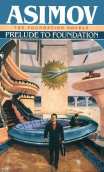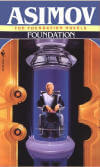 On the “Spacer” planet of Aurora, the woman Gladia’s life is a long succession of days filled with ennnui. Despite being descended from the first humans to settle other planets, her society is stagnating. Spacers live long, empty lives. Robots run all menial work and intricate rules of conduct control much of life. Into this drops D.G. Baley, descendant of Elijah Baley of The Caves of Steel and The Robots of Dawn (when Gladia met Elijah). Baley is a “Settler”, part of a new wave of colonizers from Earth who are much more dynamic than the Spacers, and are overtaking them in influence. The Settlers oppose the Spacers. He asks Gladia to come with him to help investigate a mystery. Meanwhile, powerful men plot the defeat of the Settlers.
On the “Spacer” planet of Aurora, the woman Gladia’s life is a long succession of days filled with ennnui. Despite being descended from the first humans to settle other planets, her society is stagnating. Spacers live long, empty lives. Robots run all menial work and intricate rules of conduct control much of life. Into this drops D.G. Baley, descendant of Elijah Baley of The Caves of Steel and The Robots of Dawn (when Gladia met Elijah). Baley is a “Settler”, part of a new wave of colonizers from Earth who are much more dynamic than the Spacers, and are overtaking them in influence. The Settlers oppose the Spacers. He asks Gladia to come with him to help investigate a mystery. Meanwhile, powerful men plot the defeat of the Settlers.
This is the last Robot novel by Asimov. It is part of his efforts to unify the Robot series with the Empire/Foundation series. Asimov has great ideas as usual but I found the writing hopelessly tedious. The fact that the Spacers are amazingly annoying people, haughty, self-centered and stuck up, does not help matters. I kept thinking that if I met Gladia I would have wanted to slap her. She is constantly bitching and moaning about trivialities.
As usual with Asimov, there is almost only dialogue and very little actual action. That is not a bad thing per se, but here it has been taken to an absurd extreme. Robot Daneel and Robot Giskard spend page after page discussing events (such as there are) in excruciating detail. No eventuality or possibility is left undiscussed. One character, on two separate occasions, refuses to listen to something he needs to hear until he is convinced that he needs to hear it. Both times it is a 5-10 page ordeal. I know Asimov is trying to make the point that Spacer society is stagnating and is stuck with all these rules, but it makes reading very boring. Overall, that would be the word to describe this novel: boring.
I made it two thirds in before giving up.

 The slower pace of Distant Thunders continues in the first half of Rising Tides. The story itself is divided between the Allied mission to the Empire of New Britain, salvage efforts on the S-19 submarine and a cargo ship full of fighter planes, the Allied offensive against Rangoon, and finally the adventures of the castaway Silva, Princess Rebecca and Sandra Tucker. This makes for a somewhat scattered narrative. However the action soon picks up in the second half with a harrowing climax in the heart of the Empire.
The slower pace of Distant Thunders continues in the first half of Rising Tides. The story itself is divided between the Allied mission to the Empire of New Britain, salvage efforts on the S-19 submarine and a cargo ship full of fighter planes, the Allied offensive against Rangoon, and finally the adventures of the castaway Silva, Princess Rebecca and Sandra Tucker. This makes for a somewhat scattered narrative. However the action soon picks up in the second half with a harrowing climax in the heart of the Empire.











































